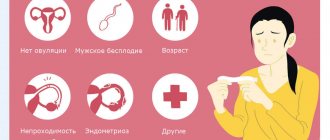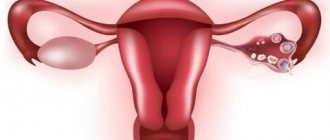You are planning a pregnancy and are looking forward to two stripes, but the delay is still far away. This article is about how to indirectly determine the condition by the first signs of pregnancy before the delay.
You need to know that there are a number of first signs of pregnancy before menstruation , by which you can determine an “interesting situation.” The medical portal mosclinic.ru will tell you the main 30 signs of pregnancy after conception, which can be seen from the first week.
The medical portal Mosklinik.ru has collected 29 of the most important and very first signs of pregnancy in the early stages before delay.
What are the first signs of pregnancy?
Unprotected intercourse leads to pregnancy in 40% of cases, but determining whether conception occurred during the first few weeks is quite difficult. Even a pregnancy test will not always be able to clarify the situation, because it must be carried out starting from a missed period. The only way to find out if you are pregnant with a 100% probability is to visit a doctor, but, unfortunately, it is not always possible to make an appointment with a doctor on the same day.
The first signs of pregnancy can make themselves felt almost immediately after conception, and in order not to suffer from the unknown, you just need to listen to your body. True, in most women these signs appear only at the end of the first month of pregnancy, and may not make themselves felt at all. It is possible to reliably find out whether you are pregnant only after implantation of the embryo and the beginning of a large-scale restructuring of the female body. A woman’s hormonal background changes significantly: in order for pregnancy to pass without complications, the entire body must prepare for intensive work for nine months.
A gestational dominant, or pregnancy dominant, occurs. Simply put, this is a program embedded in the nervous system in order to maintain the vital activity of the embryo, and then the fetus. The gestational dominant is formed immediately after implantation of the embryo into the uterine mucosa due to constant nerve impulses. This phenomenon serves as the beginning of changes in the life of the expectant mother, manifesting itself in several signs that are often found in the early stages of pregnancy.
Other early pregnancy symptoms
Hormonal changes during pregnancy may cause other signs and symptoms:
- Bloating and constipation. Increased progesterone levels cause the bolus to pass through the intestines more slowly, which can contribute to constipation. Drink more water, exercise, and eat plenty of high-fiber foods.
- Mood swings. Estrogen and progesterone levels increase during pregnancy. This can affect your mood and make you more emotional than usual. Mood swings are common during pregnancy and can lead to depression, irritability and anxiety.
- Headaches and back pain. During pregnancy, some women report mild headaches and back pain.
- Dizziness and fainting.
Symptoms subside in the second trimester
During pregnancy, you may experience all of these signs and symptoms, and some women may only experience one or two. Many of these symptoms you experience in the first trimester will begin to disappear in the second trimester. Be sure to tell your doctor about any symptoms that interfere with your daily life.
Womenfirst
- Khachkuruzov, S. G. Ultrasound examination during early pregnancy / S. G. Khachkuruzov. — 7th ed. — Moscow: MEDpress-inform, 2021.
- Obstetrics and gynecology 4th edition revised 2019.
- Ministry of Health of the Russian Federation Clinical guidelines “Obstetric hemorrhage” 2016
- FSBI "Scientific Center for Obstetrics, Gynecology and Perinatology named after Academician V.I. Kulakov" DIAGNOSTIC ALGORITHM FOR BLEEDING / PAIN IN EARLY PREGNANCY Vikhareva O.N., Tetruashvili N.K., Voevodin S.M., Demidov V.N., Shmakov R.G., Yusupov K.F. 2015
RUS2124800-2 from 03/20/2020
Taste preferences change.
A woman may have an aversion to food that she used to love. Another option is also possible: a sudden craving for foods that you don’t like in taste or smell. Loss of appetite, especially against a background of constant nausea and malaise, as well as constant hunger, are common signs of pregnancy in the early stages. The desire to try something inedible or in an unusual combination is more typical for 4-12 weeks of pregnancy, but there are cases when a woman notices this symptom already at 2-4 weeks. It is quite possible that the desire to taste chalk or eat a sausage sandwich thickly spread with orange jam is the body’s attempts to report a lack of microelements in the body. There is no need to worry ahead of time: carrying a child requires a large amount of resources, so the body tries to prepare in time and collect reserves “for two.”
How to determine the sex of a child by the last menstruation
As a rule, women are interested not only in the first signs of pregnancy, but also in the gender of the unborn child. There are many methods that allow you to find out the sex of the child even before a scheduled ultrasound. One of the popular methods is to recognize the sex of a child based on the last menstruation.
The calculation is simple: you need to add the woman’s age at the time of conception and one to the month of conception.
You should expect a boy if you end up with an odd number. Otherwise, you can safely prepare a dowry for the girl.
For example, if a woman at the age of thirty becomes pregnant in May, then she will have a girl (30+05+1=36).
At the same time, the surest way to find out about pregnancy before a missed period is a blood test for hCG and a consultation with a gynecologist.
Sudden mood swings.
You woke up in a good mood, but a minute later absolutely everything irritates you? This is not a mental disorder. Until hormonal levels stabilize, constantly changing emotions, a sudden transition from negative to positive, can accompany a woman throughout pregnancy. Explain to your loved ones that now you are more sensitive to everything that happens around you. When your hormonal levels return to normal, you will feel better. This usually happens in the second trimester of pregnancy. If emotional problems bother you too much, be sure to ask your doctor to prescribe you a mild sedative that is not contraindicated for pregnant women.
Cramps and discharge
The body of a pregnant woman at 1-4 weeks begins to change at the cellular level. A blastocyst (a group of cells on days 5-6 of embryo development), created from a fertilized egg, will subsequently form into the body parts and organs of the child.
After about 10 to 14 days (week 4), the blastocyst will implant in the endometrium, the lining of the uterus, which can cause implantation bleeding, which some women mistake for a light menstrual cycle, which usually lasts 3 to 12 days after the egg is fertilized.
4 common signs of implantation bleeding:
Pain. The pain may be mild, moderate, or severe. According to a study of 4,539 women, 28% of women attribute their discharge and light bleeding to pain1.
The color of the discharge can vary from pink or red to brown, which is normal.
Bleeding. Bleeding is usually compared to a normal menstrual cycle.
Episodes. Implantation bleeding may last less than 3 days and does not require treatment.
Implantation bleeding cramps resemble menstrual cramps, so some women mistake them and the presence of bleeding for the start of their menstrual cycle.
Also, a pregnant woman may notice white or milky vaginal discharge, which appears due to thickening of the vaginal walls, which begins almost immediately after conception. The growth of cells lining the vagina causes a discharge. These discharges are not dangerous, do not require treatment and can accompany a woman throughout her pregnancy.
Advice. If you experience a foul odor associated with your discharge, or a burning or itching sensation, be sure to tell your doctor so he can check for a bacterial or yeast infection.
Constant fatigue and loss of strength.;
These early signs of pregnancy occur primarily as a result of the body's natural reduction in immune defenses so that the embryo can fully grow and develop. Try to reduce your stress at home and at work and distribute tasks in such a way that you do not get tired. You should not drink a lot of coffee and supplements with a high caffeine content: it depletes the body's internal resources, giving a temporary boost in strength for a short time.
Features of the course of teenage pregnancy
In an adult woman, the course of pregnancy differs from that of a teenager, whose body is not fully formed.
Features of pregnancy at an early age include:
- There is a high probability of complications during pregnancy, which is why the girl must be observed by several specialists at once.
- More attentive management of pregnancy, since the gynecologist needs not just to observe the patient, but to plan her diet and select specialized medications for the healthy development of the baby.
- Possible problems with breastfeeding that arise due to the immaturity of the girl’s body.
- There is a high probability of premature birth, which is why teenage mothers are sent to the maternity hospital much earlier than usual - no later than the 36th week of pregnancy.
- If the pregnancy continues, the teenager is additionally recommended to visit a psychologist. The specialist’s task is to help the girl adapt, accept her new role as a mother, in order to prevent panic and nervous breakdowns on her part.
Heaviness and nagging pain in the lower abdomen.
These symptoms of pregnancy in the early stages are observed in almost every pregnant woman and are associated with increased blood circulation in the pelvic area during the attachment of the embryo to the wall of the uterus. The heaviness is similar to premenstrual and usually does not cause serious discomfort. Severe pain can be a sign of ectopic pregnancy, miscarriage and other pathologies, so it is important to see a doctor as soon as possible. Acute pain combined with bleeding is a symptom that requires emergency medical attention.
Changes in metabolism
As soon as fertilization has occurred, the woman’s metabolism takes a course towards satisfying the fetus with all the necessary substances.
Thus, increased production of digestive enzymes begins, and the concentration of minerals and amino acids in the blood increases. Already at an early stage, a pregnant woman begins to experience an increased need for vitamins. Internal organs also undergo restructuring. Particular stress falls on the cardiovascular region, which manifests itself in increased heart rate and increased blood pressure. The respiratory system, as well as the functioning of the kidneys, switches to an enhanced mode of operation.
The woman's genitals also undergo significant modification. The size, weight and volume of the uterine cavity grows, the ovaries and fallopian tubes increase, the external genitalia become larger, and the breasts become fuller.
Heaviness and nagging pain in the lower abdomen.
These symptoms of pregnancy in the early stages are observed in almost every pregnant woman and are associated with increased blood circulation in the pelvic area during the attachment of the embryo to the wall of the uterus. The heaviness is similar to premenstrual and usually does not cause serious discomfort. Severe pain can be a sign of ectopic pregnancy, miscarriage and other pathologies, so it is important to see a doctor as soon as possible. Acute pain combined with bleeding is a symptom that requires emergency medical attention.
Frequent urge to urinate.
The nerve endings located in the bladder react to even the slightest impact. The growing uterus puts pressure on the bladder during pregnancy, causing a constant desire to visit the restroom. This symptom is often detected at 5-6 weeks of pregnancy after a missed period, but can appear already at the beginning of the first trimester due to individual characteristics. There is evidence that progesterone reduces the tone of the bladder, which affects its physiology.
How is 1 week of pregnancy determined?
There are two ways to calculate gestational age: embryonic and obstetric. Fetal is 1 week of pregnancy after actual conception. Since it is usually almost impossible to determine the exact date of conception (unless you have had IVF), doctors all over the world count pregnancy from the 1st day of the last menstrual period, which is called the obstetric period. This formula for determining the expected date of birth is included in most online calculators and pregnancy calendars.
Interesting facts about conception:
- Conception can occur only within 48 hours from the moment of ovulation - the release of the egg from the follicle.
- Some sperm live in a woman’s body for up to 7 (or more) days, but they lose their ability to fertilize much faster.
- 2 sperm cannot fuse with 1 egg at the same time. The complex process of fertilization is thought out by nature to the smallest detail. To achieve their cherished goal, sperm must overcome several obstacles, and after each test, all paths are closed “behind the winner’s back.” Rare cases when two people manage to penetrate the body of the egg at once lead to the creation of an abnormal embryo and its self-destruction.
- When a fertilized egg divides as a result of accidental destruction of the zygote membrane, identical twins can develop! Thus, 1 egg and 1 sperm will become the “parents” of two or more children.
- So-called twins (if they are not identical twins) can appear in anyone, even if this has not been observed in your family. In some cycles, ovulation occurs more than once. Accordingly, more than 1 egg is fertilized, giving birth to several babies at once.
There are many interesting facts related to conceiving a child. But the most important question that interests many: is there a way to understand at such an early stage that you are already guaranteed to be in an “interesting position”?
Dizziness, fainting.
Brief loss of consciousness is usually associated with pressure changes. Even if a woman has never lost consciousness before, she should be especially careful. If you feel dizzy, you should provide access to fresh air: ask those nearby to open the window and ventilate the room. To avoid fainting, try to choose loose clothing made from natural materials that is appropriate for the weather. If your job involves physical labor, then you should consider reducing your workload during the day.
Second medical opinion on the image
Remember that, if necessary, the obtained X-ray images can be re-analyzed by the right specialist! You can order a repeat interpretation of an X-ray, CT or MRI using the National Teleradiology Network. A team of highly specialized radiologists will help clarify your diagnosis and provide a detailed description of the submitted x-rays and other studies within 24 hours.
Pavel Popov
Candidate of Medical Sciences, Member of the European Society of Radiologists
Breast sensitivity increases.
Even a slight touch to the mammary glands can cause pain; some women experience colostrum discharge from the nipples. Later, the breasts swell, enlarge, and the nipples darken. These are some of the signs that pregnancy manifests itself in the early stages. You may notice chest tenderness when moving or playing sports. Try wearing loose underwear that doesn't restrict movement. It is worth stopping active physical activity for a while, replacing it with yoga and stretching. Give preference to clothes made from soft materials that do not cause you discomfort.
Heartburn.
The appearance of heartburn in the early stages is also explained by changes in hormonal levels. This symptom can occur at the very beginning of pregnancy and does not disappear until childbirth. A feeling of discomfort or burning behind the sternum is provoked by the reflux of acidic stomach contents and usually does not indicate a serious pathology. Drinking chocolate, strong tea and coffee, as well as citrus fruits increases heartburn attacks. You may want to avoid these foods at least during the first trimester of pregnancy. Wearing tight and uncomfortable clothing can also cause heartburn. It is worth monitoring your diet more carefully and avoiding long periods of time between meals.
What to do: maintain or terminate the pregnancy?
The final decision must be made only after the girl is examined by a gynecologist. The specialist will assess the health status of the teenager, analyze the development of pregnancy and its duration.
Neither physiologically nor morally young girls are ready for childbirth and motherhood. And no matter what decision is made, there are rarely consequences to avoid.
When deciding to terminate a pregnancy, you should remember several points:
- abortion is a serious psychological trauma;
- difficulties with subsequent conception are likely, including infertility;
- hormonal balance is disrupted;
- immunity decreases, destabilization of the endocrine system occurs;
- the risk of puncture of the uterus increases due to its underdevelopment;
- there is a risk of developing serious inflammation;
- there is a possibility of incomplete removal of the fertilized egg;
- the menstrual cycle is disrupted.
Having maintained the pregnancy, a girl may face the following problems:
- changing the usual way and rhythm of life;
- the need to take care of the baby, for which the girl is not mentally prepared;
- psychological discomfort caused by judgment from other people;
- lack of funds, since not all parents have the opportunity to help, some refuse help altogether;
- lack of maternal feelings for the child due to the girl’s emotional immaturity.
Russian legislation establishes the right of choice for 15-year-old adolescents, so they can independently decide whether to continue or terminate a pregnancy.
Increase in basal temperature.
The indicator measured rectally varies depending on the woman’s hormonal background. Basal temperature can indirectly determine both ovulation and pregnancy. In the early stages, the rectal temperature rises, and pregnancy is indicated by the fact that there is no decrease in the value after a few days, as with normal cyclic changes. If this is not your first attempt to find the happiness of motherhood, then you most likely know the rules for measuring basal temperature: the correct value is the one obtained immediately after a night's sleep, without getting out of bed. Stress can affect your test results, so it's a good idea to calm down or take a medication approved by your healthcare provider before going to bed.
Toxicosis.
Toxicosis of pregnant women usually appears at 4 or 5 weeks after conception, but nausea and vomiting can begin to bother the expectant mother as early as the first month. Nausea is usually accompanied by weakness, lack of appetite, and headache. These symptoms during pregnancy cause a lot of trouble for the expectant mother, especially if vomiting is repeated and interferes with daily activities. Antiemetics that are not contraindicated for pregnant women are available today at any pharmacy, but you should consult a doctor before using them.
The appearance of acne.
This symptom is also associated with hormonal changes in the body. Acne can appear even in women who have never suffered from it before. Acne during pregnancy usually disappears when hormonal levels stabilize and no longer bothers the woman. You can often miss this phenomenon, mistaking it for a component of premenstrual syndrome, especially if you have previously been treated for acne. Topical, and especially systemic, retinoids can adversely affect fetal development, so you should stop using these medications if there is a delay.
Increased abdominal volume.
To bear a child, not only the mother’s internal resources are required, but also reliable protection. The layer of subcutaneous fat in the abdomen is necessary to maintain the optimal temperature of the internal organs. Weight gain in this area is a feature of the female body that has existed since ancient times, which allows, in case of hunger, to use reserves as an energy substrate to support the life of the expectant mother and baby. Eating “for two” is not an option in this case: it is worth distinguishing between emotional and physical hunger. Excessive weight gain is harmful to the baby and complicates the course of pregnancy, and is also a risk factor for gestational diabetes.
And yet, the main symptom, the appearance of which may mean pregnancy, is a delay in the onset of menstruation for more than three days
. Obstetrics classifies it as probable signs, and the above symptoms are only speculative. From the very first days of the delay, the presence of pregnancy is confirmed with fairly high accuracy using special tests that respond to an increase in the content of hCG (human chorionic gonadotropin) in the urine. These are various test strips that are convenient to use at home. There are several rules that reduce the likelihood of false positive and false negative results:
- It is worth using morning urine, since the hCG content in it is higher.
- It is not recommended to increase the amount of fluid consumed before the test. Urine diluted with water has a lower concentration of the hormone and is not informative for the test.
- It is important to check the expiration date of the test. Expired tests may show incorrect results.
The most rational decision if the test result is positive is to consult a doctor in order to determine the quantitative value of hCG and undergo a transvaginal gynecological ultrasound. This procedure allows you to most accurately determine the duration of pregnancy and ensure that the embryo develops inside the uterus, excluding ectopic pregnancy.
How to accurately diagnose pregnancy at 1 week?
At 1 week, the fetus consists of only a few cells and is still moving towards the uterus. The woman’s body begins to undergo strong changes, but there are no external signs of fertilization, there are only subjective sensations.
Just 1 week is too early for a doctor or home test to determine the presence of a fetus. Under the influence of the hCG hormone, test strips will show pregnancy from 8-10 days after embryonic conception - this is already 2 weeks. You should consult a doctor and undergo an ultrasound after 2-3 weeks, when the embryo becomes large enough to be examined.
An exception to diagnosis is the IVF process, which is completely under the supervision of doctors. In this case, pregnancy can be diagnosed literally from the first day, but it is considered accomplished only when the embryo is implanted in the uterus.









